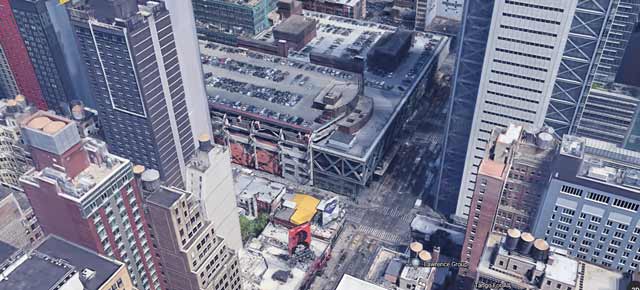 |
| Port Authority Bus Terminal, viewed from the southeast in 1979. |
My goal with this series of then-and-now articles is not to prove anything in particular. If things have changed, that's interesting, but if things are the same after 40 or more years, that's interesting, too. This is a review of how things compare to the past, not a polemic on changing cities or anything like that.
Above is a view of the Port Authority Bus Terminal in Manhattan sometime during 1979 (from the looks of it, during the winter). It is taken from the southeast and shows the intersection of West 40th Street and Eighth Avenue. People familiar with the city know this is about a block west of Times Square, though most tourists probably never go over to see it. If you're not travelling by bus, there's really not much reason for a tourist to visit this area.
Incidentally, nobody actually calls it "The Port Authority Bus Terminal" unless theyr'e trying to sound formal. It's just the Port Authority to most New Yorkers. If you say you're heading to the Port Authority, everyone will understand where you're going.
I'm going to dissect part of this photo that you're likely not noticing and discuss how that reflects a changing truth about New York.
 |
| Port Authority Terminal recently (Google Earth). |
Viewing the Port Authority Terminal from the same angle we can see that it looks pretty much the same. Let's get a little closer.
 |
Port Authority Terminal recently (Google Earth).
|
We can see from this view that the Port Authority structure is the same as it was in 1979. There has been some superficial work on the exterior, but not a lot has changed. Basically there it was, and there it is, and that is that.
 |
Port Authority Terminal recently (Google Earth).
|
One thing that has changed, though, is the parking lot on the southwest corner of the intersection. In 1979, it was just a parking lot. You may not know this unless you drive in the city, but parking has changed a lot in New York City in the last 40 years. And that uncovers a larger truth about NYC.
 |
Port Authority Terminal recently (Google Earth).
|
Public surface parking lots are disappearing in Manhattan, victims of condo development and growing official disfavor of motor vehicles. Nowadays, getting a private parking spot is considered one of the pricey perks of buying a condo and is very hard to do otherwise. Since the condos themselves have been one of the prime causes of disappearing public lots, this has worked out well for the condo developers.
 |
Port Authority Terminal recently (Google Earth).
|
Things have changed drastically regarding parking since the 1979 photo was taken. It used to be that developers were required to provide parking because, you know, the United States was a car culture and people needed their cars. Private developers in much of the city were actually
required to provide a parking space for four out of every 10 apartments in their buildings. This led to a lot of land set aside for lots.
 |
Port Authority Terminal recently (Google Earth).
|
However, this changed completely in 1982, when the city effectively banned new parking lots south of 110th Street. Ever since, the number of parking spaces provided by developers cannot exceed 20 percent of the total number of apartments in buildings from Midtown down to Manhattan’s southern tip. In addition, a 35 percent cap applies to the Upper East and West Sides. So, instead of there being a
requirement that a minimum number of parking spots be provided, now there is a
limit on how many can be provided. You are not required to provide any at all. That's a big, but subtle, change.
 |
Port Authority Terminal recently (Google Earth).
|
So, basically, everything has been conspiring against the parking lots that used to dot Manhattan. The city disfavors them, and the condo developers now can offer them as a "special perk" to their clientele - for a price. Believe it or not, some establishments now charge upwards of $200,000 for a parking spot. No more of this "$10 for 10 hours" stuff. You buy a parking spot just like you buy your apartment, and if you don't, you have nowhere to park except wherever you can find a space on the street. Good luck finding one nearby, and then you have to play the "alternate side parking" game and all that.
 |
Port Authority Terminal recently (Google Earth).
|
Anyway, the former parking lot site is now home to the Beer Authority, considered one of the best beer gardens in the city. It's only a two-story building, probably because the property owner long ago sold the air rights to some nearby tower. This is the Garment District, and people like their beers and typical pub fare like chicken wings. There are over 100 beers on draft, in addition to a full bar. Now that's a nice selection! So, if you're a prospective tourist reading this, you may not be able to park your car, but you now can get your fill of beer!
 |
View looking southeast from the Port Authority Terminal recently toward where the original picture was taken in 1979 (Google Earth).
|
Anyway, the point I'm making is that New York City is a very subtle place. A simple tourist snapshot from the 1970s compared with the current location uncovers some surprising truths about changing life in the city. A missing park lot may seem like small potatoes - but not when it uncovers a much larger and pervasive truth.
Many thanks for visiting! If you like this content, kindly consider visiting some of my other "Then and Now" pages.
2020










No comments:
Post a Comment
Note: Only a member of this blog may post a comment.